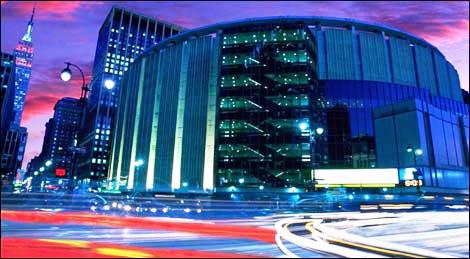Madison Square Garden Information

Opened on February 11, 1968, Madison Square Garden is a 20,000 capacity sports and concert arena, located in the New York City borough of Manhattan, above Pennsylvania Station. It was named after James Madison, fourth President of the United States, and is the fourth New York venue to be named Madison Square Garden.
Home to the New York Rangers of the National Hockey League, the New York Knicks of the National Basketball Association, and residency to singer-songwriter Billy Joel, the arena is famous the world over. After an extensive renovation period between 2011-2013, and at a total construction cost of approximately $1.1 billion, Madison Square Garden has been ranked as one of the 10 most expensive stadium venues ever built.
Hosting more high-profile concert events than any other venue in New York City, the Madison Square Garden stage has seen performances from some of the biggest names in music, including: Elvis Presley, Led Zeppelin, The Police, Madonna, U2 and Ariana Grande.
“Madison Square Garden is my favorite venue in the whole world. I chose to have my 60th birthday concert there, because of all the incredible memories I’ve had playing the venue.”
– Elton John
“Madison Square Garden is the center of the universe as far as I’m concerned. It has the best acoustics, the best audiences, the best reputation, and the best history of great artists who have played there.”
– Billy Joel
Madison Square Garden is one of the world’s most iconic entertainment destinations. Located at 4 Pennsylvania Plaza in the heart of Manhattan, it sits above the rail and subway hub of Pennsylvania Station, offering exceptional accessibility for visitors arriving by train, subway, or bus.
Event Variety and Capacity
The arena hosts more than 300 events each year, offering a mix of sports, concerts, family shows, and special performances. Guests can catch high-energy basketball games with the New York Knicks, thrilling hockey matches with the New York Rangers, or internationally renowned concerts featuring artists from every genre.
MSG also hosts boxing matches, wrestling events, award shows, and cultural performances, ensuring there is something for every interest. Seating capacity varies by event type, with basketball games accommodating up to 19,812 fans, and concerts typically seating around 20,000.
Premium Experiences
Madison Square Garden provides a range of premium experiences to make every visit special. Luxury suites and club-level seating offer exclusive amenities, including private lounges, in-seat service, and upscale dining options. Accessible seating and assistive services ensure that all guests can enjoy events comfortably.
Immersive Atmosphere
From the energy of the crowd to the clarity of the sound and the vibrancy of production, every detail is designed to create an immersive and memorable experience for visitors of all ages and interests.
The combination of dazzling lights, dynamic visuals, and synchronized audio ensures that every moment feels engaging, exciting, and unforgettable, making each event at Madison Square Garden a truly one-of-a-kind experience that resonates long after the final performance ends.
About Madison Square Garden
Understanding what makes Madison Square Garden special begins with exploring its facilities, amenities, and the diverse range of events it hosts. This section highlights the venue’s operational excellence and what visitors can expect when experiencing this Manhattan landmark, recognized worldwide for entertainment and cultural significance.
The World’s Most Famous Arena
Madison Square Garden has earned its nickname through decades of legendary performances, historic sporting events, and cultural milestones. Located in the heart of Midtown Manhattan, the arena sits above Penn Station, offering unparalleled access via subway, train, and bus, making it easy for both local fans and visitors from around the globe to attend events.
The current building marks the fourth incarnation of Madison Square Garden, continuing a legacy spanning more than a century. Its distinctive circular design and iconic exterior have made it an architectural landmark, recognized as one of the most famous arenas in the world.
Over the years, the venue has become synonymous not only with entertainment excellence but also with memorable moments in sports, music, and public events.
Amenities and Facilities
A $1 billion renovation transformed Madison Square Garden into a modern, state-of-the-art facility while carefully preserving its historic character. The improvements included upgraded seating and sightlines, expanded concourses, enhanced lighting and sound systems, and upgraded digital infrastructure, all designed to improve the guest experience from arrival to departure.
Climate-control systems ensure comfortable temperatures year-round, while wider concourses and clear wayfinding improve crowd flow during busy events. Restrooms were upgraded and expanded to reduce wait times, and digital displays provide real-time information about events, directions, and promotions.
Free WiFi and improved mobile connectivity allow guests to stay connected, share experiences, and access event details effortlessly.
Types of Events and Live Entertainment
Madison Square Garden hosts an extraordinary variety of events year-round. Professional sports anchor the venue with the New York Knicks (NBA) and New York Rangers (NHL), attracting passionate fans and creating electric atmospheres.
Concerts bring international music stars across genres, including pop, rock, country, hip-hop, and classical, while special performances, family shows, and cultural events cater to audiences of all ages.
The arena maintains a long-standing tradition of hosting boxing, mixed martial arts, and wrestling events, drawing both local and global attention. Its flexible design enables quick configuration changes for each event type, creating an immersive experience that maximizes sightlines, acoustics, and production value.
Concessions and Dining
Madison Square Garden’s MSG Eats program offers a wide range of food and drinks with over 50 locations throughout the arena. Guests can enjoy classic arena snacks like hot dogs, pretzels, and popcorn, as well as burgers, pizza, and international options like Asian, Italian, Mexican, and Mediterranean dishes.
Premium dining is available to suite and club seat holders, featuring table service, special menus, drinks such as wine, craft beer, and cocktails, and personalized service. Plant-based, gluten-free, and other diet-friendly options ensure that everyone can find something they enjoy. Whether grabbing a quick snack or having a pre-show meal, MSG’s dining options enhance the overall experience and add to the venue’s world-class reputation.
The Story Behind the Arena
With a legacy that spans more than a century, Madison Square Garden has evolved through several incarnations to become one of the world’s most iconic arenas. From its origins above Madison Square Park, through eras of high‑society spectacles and championship sports, to its present form atop a major transportation hub, MSG has long been at the crossroads of entertainment, culture, and history.
The Madison Square Garden Legacy
The name “Madison Square Garden” first appeared in 1879 when a venue opened near Madison Square Park at 26th Street and Madison Avenue. That original space hosted circuses, exhibitions, and large public gatherings. The second MSG, completed in 1890 on the same site and designed by Stanford White, became famed for its architectural grandeur and high‑society events, operating until 1925.
In 1925, the third incarnation of MSG opened on Eighth Avenue between 49th and 50th Streets. This arena, with a seating capacity of around 18,000, became a major venue for boxing, hockey, and other large public events and served for over four decades until its closure in 1968.
The current (fourth) MSG opened on February 11, 1968, at its present location between 31st and 33rd Streets and Seventh to Eighth Avenues, built atop the railroad tracks of Pennsylvania Station. Its distinctive cylindrical form and multi‑use design cemented its status as a landmark of entertainment and sport.
Construction and Development
The construction of the current Garden proceeded amid controversy, particularly due to the demolition of the original Penn Station and public outcry over the removal of the city’s Beaux‑Arts rail terminal. The construction cost for the 1968 building was reportedly around US $123 million.
Over time, major renovations have updated the arena, including a comprehensive overhaul from 2011 to 2013 and modernized seating, technology, and amenities while preserving MSG’s iconic character.
The architect credited with the 1968 design is Charles Luckman, and the structural engineering employed a suspended roof to create wide-open interior spaces without obstructive support columns.
Notable Historic Moments
Madison Square Garden has been the backdrop for countless unforgettable moments in sports, music, politics, and culture. From legendary games to iconic concerts and major political events, MSG has played a key role in shaping history. Here are some of the most memorable highlights:
- Boxing: The “Fight of the Century” on March 8, 1971, between Muhammad Ali and Joe Frazier drew massive attention and remains one of the most iconic bouts in boxing history.
- Basketball: The New York Knicks won NBA championships in 1970 and 1973, with Willis Reed’s dramatic return in Game 7 of 1970 standing out as a defining moment in the arena’s history.
- Music and entertainment: MSG has hosted concerts by countless music legends across all genres. Notably, it held a special tribute concert for 9/11 victims on October 20, 2001, highlighting its role in cultural and emotional milestones.
- Politics: The arena has hosted major political events, including the 2004 Republican National Convention, showcasing MSG’s importance beyond sports and entertainment.
These moments reflect MSG’s long-standing reputation as a world-class venue where history, culture, and excitement come together in one unforgettable place.
